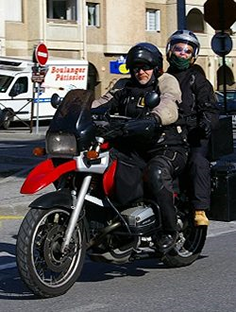 On the 14th October 2011 the Federation of European Motorcyclists Associations (FEMA) reports that representatives of the Federation delivered the bulk of 110,000 signatures from citizens across Europe opposing EU Commission plans to make Periodical Technical Inspections (PTI) mandatory for motorcycles.
On the 14th October 2011 the Federation of European Motorcyclists Associations (FEMA) reports that representatives of the Federation delivered the bulk of 110,000 signatures from citizens across Europe opposing EU Commission plans to make Periodical Technical Inspections (PTI) mandatory for motorcycles.
FEMAs campaign started in reaction to a public consultation held online between July and September 2010, when the European Commission asked citizens for their opinion on the extension of PTI to motorcycles across Europe.
FEMA argues that, “An extension of PTI will not improve road safety, and only represents an unjustified additional financial burden on motorcyclists. There is no conclusive evidence of a positive impact on safety. Technical failures only account for 0.3% of motorcycle accidents, and only a fraction could be avoided by bi-annual inspection schemes”.
A Small Number
This 0.3% of motorcycle accidents appears in the FEMA Position Statement – On Periodical Technical Inspections / Road Worthiness – September 2010 where FEMA has based the 0.3% on the MAIDS report (although that figure refers to all vehicle failures including cars).
What must be remembered is that the percentages of figures in the MAIDS report concerns the study of a total of 921 motorcycle and moped accidents during the period 1999-2000 in five sampling areas located in France, Germany, Netherlands, Spain and Italy.
Twice A Year
With regards to the comment by FEMA about the frequency of PTI being “bi-annual” this is misleading.
We were unable to find any Commission document (proposal, consultation etc) to suggest that the frequency of PTI would be twice a year.
What we suspect is that this mistake has come from a CITA document (AUTOFORE – Study on the Future Options for Roadworthiness Enforcement in the European Union which states, “The introduction of bi-annual technical motor vehicle inspections for motorcycles with insurance marks could lead to 24 fewer deaths in accidents (…)”.
Perhaps lost in translation was the word “Biennial” which means (an event) lasting for two years or occurring every two years.
However this comment has caused quite a stir amongst some motorcyclists who now think that they will have to have an inspection every six months!
Alternative
The alternative to PTI according to FEMA, is that the manufacturers should extend warranties and cover the cost of defects and emissions.
There are two possible outcomes to this: the consumer (us) will end up paying for the cost of extending warranties or the manufacturers will go out of business. Also, there will have to be a cut-off point when the warranty will expire.
Then what?
With regards to measuring emissions FEMA also states that it “Considers the manufacturer of a vehicle as the main party responsible for the level of emissions the vehicle is producing. If the vehicle fails to comply with standardised emission limits after a certain mileage, the user must not be held liable for the costs arising from repair. If legislators require periodical checks of the emission level, this burden must not be put on the consumer either.”
Bigger Picture
However we are equally aware that within the Commission’s proposals for the approval and market surveillance of 2 and 3 wheel vehicles and quadricycles, there are other issues relating to emissions, durability and on board diagnostics. In our response to the DfT’s consultation on these proposals, we disagreed with FEMA and argued that the MoT (or PTI) is more effective in terms of cost and reliability.
While we understand that riders in other countries may wish to fight for their “freedom of choice, in the real world, we believe that PTI for motorcycles will be introduced across Europe, not least because the UNECE WP29 in Geneva is already discussing world-wide periodical technical inspections for all vehicles including motorcycles and mopeds and considering an international PTI certificate.
In the grand scale of things, it will be difficult to convince representatives from countries throughout the world that PTI is not a good idea.
National Provisions
Representing FEMA member organisations, the FEMA President Gerard Livett delivered along with the petition, a letter for European Commissioner for Transport Siim Kallas, asking him to listen to the voice of the motorcycling community,: “Motorcyclists across Europe are worried that a future project will introduce a harmonized system with compulsory periodical inspections for powered two-wheelers, since it would bring an end to national provisions, which in most cases have proved satisfactory, cost-effective, and adapted to the reality of powered two-wheeler practice.”
In principle we agree with FEMA, that PTI schemes for motorcycles should be left to the discretion of national governments, for example in Northern Ireland and the rest of the UK we have PTI (which is known as the MoT) in place. In Northern Ireland the annual fee is £22.00.
However, the Commission has stated its intent on possible new policies to extend PTI to 2 wheeled vehicles (mopeds, scooters and motorcycles) across Europe through a harmonised system, we have no knowledge nor it would appear does anybody else, of what the Commission aims to propose and whether it would bring changes, or as FEMA have stated, an end to our own national provisions.
View the full article on Right To Ride EU – with relevant links and references – Click Here


